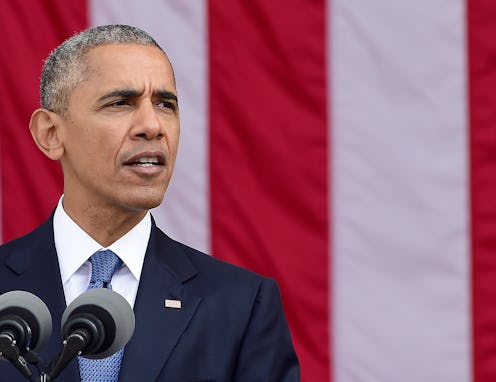News
The First Major Blow To Obama's Legacy Is Here
Well, this didn't take long. Less than a week after Donald Trump was elected president of the United States, the first major blow to Barack Obama's legacy has been dealt. Marriage equality and the Affordable Care Act remain untouched for now, but the results of the election are influencing foreign policy in a big way — not least because Trump's victory was so unexpected. According to The Hill, the Obama administration has given up on trying to pass the sweeping Trans Pacific Partnership (TPP) trade deal, which would have linked the United States and 11 countries along the Pacific Rim.
Obama had hoped the TPP would become part of his legacy before he leaves office in January, but Democratic and Republican leaders have both announced they will not bring the trade deal forward during the upcoming lame-duck session of Congress. The free trade deal was designed to reinforce relationships with U.S. allies in Asia, eliminating many tariffs and encouraging trade among the countries involved. Because China was notably excluded from the deal, the TPP was also seen as an effort to balance the country's rapidly growing economic clout. The deal was signed by 12 member nations in February, but it still required a two-year ratification period.
The deal had its supporters and detractors in both political parties. In 2015, Republicans like Senator Marco Rubio and Pat Toomey were publicly in its favor, while Bernie Sanders was openly critical during his campaign for the Democratic presidential nomination. During her time as secretary of state, Hillary Clinton supported the bill, but during her presidential campaign, she came out against it.
Then there was Trump's vehement opposition to the deal, which the president-elect once called a "continuing rape of our country." He vowed to discard the TPP, along with many other aspects of Obama's legacy, and has threatened to leave the North American Free Trade Agreement as well. The TPP was seven years in the making.
"We have worked closely with Congress to resolve outstanding issues and are ready to move forward, but this is a legislative process and it's up to Congressional leaders as to whether and when this moves forward," said a spokesperson for U.S. Trade Representative Michael Froman, according to the Washington Post. Clinton's public opposition made passing the accord a long shot if she had been elected president, but it was still within the realm of possibilities. With Trump set to take office on January 20 and Congressional leaders failing to bring it forward for consideration, however, the deal is all but dead.
This is just one of many ways Trump has promised to dismantle the legacy Obama intended to leave behind. The president-elect has vowed to curb climate change regulations, break up the complex Dodd-Frank Wall Street Reform and Consumer Protection Act, and of course, repeal Obamacare entirely. It's also difficult to predict the effect a Trump presidency will have on the United States' international reputation, which Obama has painstakingly built back up over the last eight years.
Trump can't singlehandedly walk back every action Obama has taken, but with a Republican-controlled Congress that has fought the current president on more issues than they've agreed upon, Obama's legacy may not last in the way he hoped.
